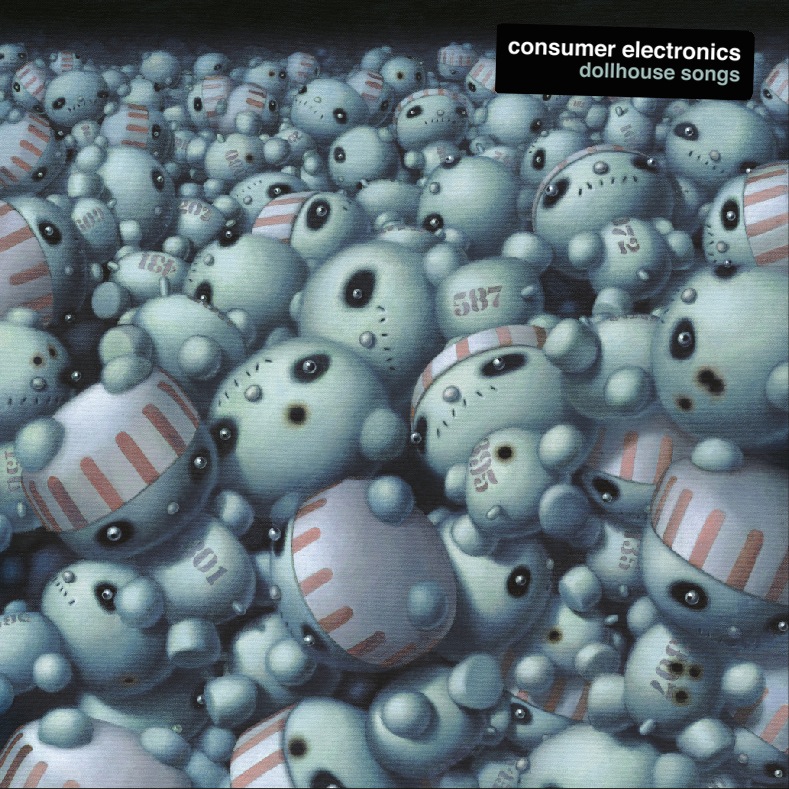Last year, Consumer Electronics, the power electronics duo of ex-Whitehouse member Philip Best and his wife Sarah Froelich, bolstered by producer Russell Haswell, released one of the most brutal, uncompromising and violent noise records this country has seen for quite some time. Estuary English was, at under 30 minutes, a mercifully short (not because it’s a bad album -quite the opposite- but because it would be hard to take more of its abrasive sonic punishment) tirade against the Britain of David Cameron, George Osborne and UKIP. On Dollhouse Songs, Best, Froelich and Haswell broaden the scope of their sonic broadsides, directing a wall of fury towards the ills of the world at large that rivals, and possibly even surpasses, the one on Estuary English.
Those for whom the above paragraph might suffice to convince of Dollhouse Songs‘ merit might therefore be a tad surprised by the album’s opening salvo, as Best whispers quietly over a carpet of fizzy, but hardly explosive, electronic drone at the start of ‘History Of Sleepwalking’. Rest assured, noiseniks, this is a case of Consumer Electronics getting more expansive, not less abrasive, and it’s mere moments before Haswell kicks in with some blistering martial beats and Best leaps from murmur to his characteristic howl with the line "How the fuck did I get here?". Consumer Electronics’ tendency to hurl oaths and revel in shocking imagery on stage somewhat obscures the sheer poetry of their lyrics, and Dollhouse Songs contains some of their most evocative imagery. "Save yourself/From this pain this hedonism/Shaped by adult hand/Good solid hand/Occult bankers/Ministers of state/Roped around your feet," Best shrieks a bit later on ‘History Of Sleepwalking’, his politics clear even as he flounders in the despair of what our leaders are doing to us ("Learn your fucking place!" he also barks in Cameron-mode), even as we sleepwalk towards letting them go further and further with their corruption, lies and manipulation. The track ends with a brutal, emphatic exhortation: "Reject obligation and fear/Become a fucking insult/And kill them in their beds". This may sound like typical noise fare, but in the hands of Consumer Electronics comes over more like a revolutionary mantra.
‘Knives Cut’ picks up where ‘History Of Sleepwalking’ let off, with a whirlwind of feedback, gristle and Best’s snarled vocals as the singer plunges to new depths despair and anger with lines like "Tear your mind into parts" and "Not the slightest hope of ever fucking making it". This is noise at its most misanthropic, yes, but also its most cathartic and liberating. On ‘Condition Of A Hole’, Best hands vocal duties over to Froelich. Her voice is if anything even more challenging than Best’s, given even more edge by a backing that sounds like guns going off as buildings collapse into dust and a distortion effect that at one point makes her sound like a deranged android. She also takes singing duties on ‘Murder Your Masters’ (another call to arms!) which features more nihilistic poetry ("Here is what we know/Fictitious capital, hopeless heat, rainforest depletion/North American drought, nuclear Pakistan […] You need to make amends!") that reads like a checklist of the world’s escalation into an apocalypse of war, poverty and environmental catastrophe. Here, alongside the crunching beats and whigged out noise, an icy, drifting synth drone turns the track from vicious tirade to mournful elegy for a dying species, a reminder that there is so much more to Consumer Electronics than bile and vitriol.
Best reprises the mic for ‘The Push’, a typical broadside directed at London’s social divides that see the poor priced out to make way for rich oligarchs and corrupt financiers ("Woe to bloody city full of lies and robbery!" is the wonderful opening line, whilst the concluding lament of men’s murderous ways is equally powerful). Alongside these stirring, almost histrionic non-songs dominated by stop-start rhythms, grueling noise, moments of silence and powerful percussion sits the instrumental ‘Nothing Natural’ and, at the album’s conclusion, the elaborate, partly wordless ‘Colour Climax’. Best reprises the whispered vocal style of the opening part of ‘History Of Sleepwalking’, delivering broken musings on life’s inevitable disappointment and decay, sounding both defeated and defiant in equal measure. The closing lines are heavy with poignancy: "This is it/the bare life/it feels like love/doesn’t it?", revealing the breadth of Best, Froelich and Haswell’s worldview and the sadness that underlies their anger.
Dollhouse Songs is both longer and broader than Estuary English and the fruits of the trio’s ambitions are manifold. Again, this is no easy ride, but if you follow Consumer Electronics as they strip bare the caustic facade of modern living, you will find power and, yes, beauty in the dark recesses they reveal.
<div class="fb-comments" data-href="http://thequietus.com/articles/19249-consumer-electronics-dollhouse-songs-review” data-width="550">


